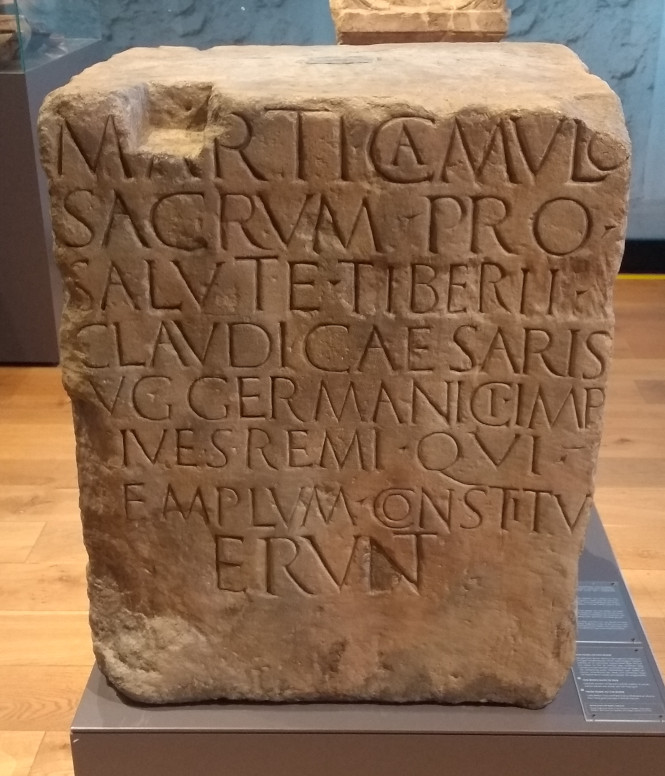Camulos

Camulos, also Romanized as Camulus, is a God who is known from several territories on the continent and in Britain, and has been interpreted with Mars.
Meaning
Delamarre (2003) suggests ‘champion, servant ?’ as an uncertain definition for the root camulos, besides the more obvious meaning, ‘epithet of Gaulish Mars’.
Delamarre goes on to write:
There is a rare word in OIr., cumall ‘champion’ whose meaning seems best suited for the Gaulish word, LEIA C-287, US 70; the feminine cumal < *kamulā means ‘slave, servant woman’ from a root *kemə- [*kemh2] ‘to labor, make an effort’ (Greek kámnō, skr. śamnīte, IEW 557), but we see it poorly suited to onomastics: Camulorix ‘Servant-King’ (d’Arbois de Jubainville) is strange, unless it is necessary to interpret it according to K.H. Schmidt’s theory on the -rix suffix, ‘Rich-in-Servants’, which remains an equally improbable appelative (except perhaps for a god, cf. the personal name Magurix, of similar meaning); the general sense of camulo- would be ‘he who makes effort’, which works just as well for a champion as for a servant; formed on the agentive suffix -lo- (meddilos, dugilos, etc.) Edgar Polomé, Ogam 6 [1954], 157, linked Camulo- to the personal name of the Scandinavian royal family Humli. One doesn’t dare suggest an analysis through *ḱmulos [*ḱmHulos] > camulos on the IE root *kem(H)-, meaning ‘animal without horns’: Lithuan. šmùlas ‘hornless’, Skr. śámah ‘id.’, Greek kemás ‘fawn’, Germ. Hinde ‘hind’ (*kemtā), IEW 556.
De Bernardo Stempel adds:
*KmH-u-lā, cf. Gaul. Camulus, epithet of Mars: LEIA-C-286f. and IEW: p. 557. The basic word for this derivation, which is to be interpreted denominally, is probably to be found in a word for ‘concern’, cf. also LEIA-C-285 s.v. cuma “f. dental stem, ‘grief, sorrow’”. To the Hispanoceltic equivalent with -alo- see below note 63.
The two senses offered by Delmarre and De Bernardo Stempel are in agreement if one considers how the root meaning “laboring, tiring one’s self, making an effort,” as Delamarre writes, can relate just as well to feeling concern, sorrow, and grief as it would to acting in the role of either a servant or warrior.
Interpretatio
Camulos was interpreted with The God Mars at least seven times, primarily in Gallia Lugudensis. This practice is known from territories that were under Menapii, Remi, and Treveri control. He was also attested as such in Limes Germanicus, among the Cugerni in Germania Inferior, and in Britannia at the Antonine Wall and in Trinovantes territory.
Related Names
Theonyms
- Camuloriga
- Camulorix
Toponyms
Britannia
- Camulodunum
- Camulosessa
Gallia
- Camolia > Chamouille (Aisne)
- *Camuliacum > Chamouillac (Charente-Mar.) and Chamouilley (Hte-Marne)
Personal Names
- Camulus
- Camalus
- Camula
- Καμουλα Camula (*G-273)
- Camulaeus
- Camulatia
- Καμουλαπ/α Camulapa (G-67)
- Camulatus
- Camulata
- Camuledu
- Camulinus
- Camulissius
- Camulius
- Camulixus
- Camulogenus
- Camulognata
- Andecamulos
Votives
Note this is not an exhaustive collection:
- Bar Hill Fort, Antonine Wall (Britain): RIB 2166 (CIL 7 1103) : Deo Mar/ti Camulo / [m]ilites coh(ortis) [I] / Hamioru[m] / […]CIV[.]SC[…] / […]IVI[…]
- London, UK: AE 2002, 882, RIB 3014: Num(inibus) Augg(ustorum) / deo Marti Ca/mulo Tiberini/us Celerianus / c(ivis) Bell(ovacus) / moritix / Londiniensi/um / primus [.].. / […]VA[…] / […]
- Reims, France: ILTG 351; AE 1935, 00064 [In] honor[em d(omus) d(ivinae)] / […] Martis Cam[uli …] / [Iucundiniu[s …] / [Laurenti]um Lavinat[ium
- Arion, Belgium: CIL 13 3980 : Marti / Camulo / Lellius / Settus / v(otum) [s(olvit)] l(ibens) m(erito)
- Kruishoutem, Belgium: AE 1992, 01244 : Deo Marti Camulo / Verecundus Fructi / v(otum) s(olvit) l(ibens) m(erito)
- Rindern, Germany: CIL 13 8701 Front reads: Marti Camulo / sacrum pro / salute [Neronis] \<\<Tiberii>> / Claudi Caesaris / [A]ug(usti) Germanici Imp(eratoris) / [c]ives Remi qui / [t]emplum constitu/erunt; Back reads: corona / quernea in qua: / O C S]]
- Mainz, Germany: CIL 13 11818 : Marti / Camulo / sacrum / [ // Fronto / T[…]oni f(ilius) / d(onum) d(edit)
- Sarmizegetusa, Romania: AE 1998, 01100 : Invicto / Mithrae / Marti Camulo / Mercurio / Rosmertae / Q(uintus) Axius Aeli/anus v(ir) e(gregius) / proc(urator) Aug[g](ustorum) / Ioni(us)
References
- De Bernardo Stempel, P. “Götternamen in Germania Inferior”, in Keltische Götter im Römischen Reich (2005), W. Spickermann and R. Wiegels, Eds., p. 139.
- De Bernardo Stempel, P. Nominale Wortbildung des Älteren Irischen (2011), pp. 450-451
- Delamarre, X. Dictionnaire de la langue gauloise (2003).
